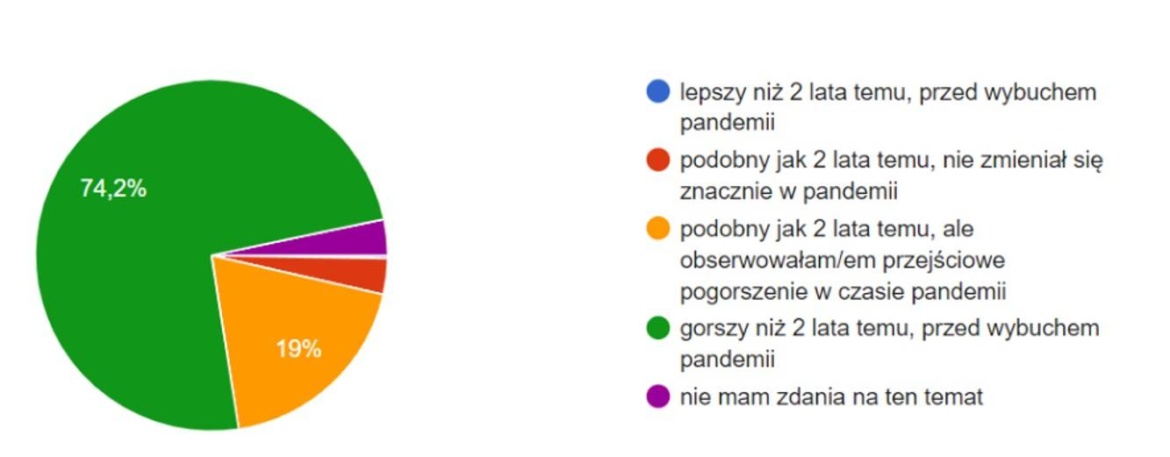74% psychiatrists believe that Poles' mental health is worse this autumn than it was before the pandemic broke out, according to a survey conducted by the Dialog Therapy Centre from 25-29 September among psychiatrists from across Poland.
Following recent media reports about increasing numbers of patients with psychiatrists and psychotherapists, the Dialog Therapy Centre decided to ask a representative sample of 350 psychiatrists from all over Poland: "What is the current mental state of Poles?". 74.3% of the respondents considered the mental state of Poles to be worse than 2 years ago before the pandemic outbreak, 19.1 % said that "it is the same, but I observed a temporary deterioration during the pandemic", while 2.9% of the respondents indicated that the state is "similar to 2 years ago, did not change significantly during the pandemic". Only 1% of the participating psychiatrists ruled that the mental state of the Poles had improved. During the survey, the doctors were also able to justify what they based their assessments on.
MORE AND MORE PATIENTS SEEING A PSYCHIATRIST
According to the survey participants, psychiatrists are now concerned about the mental condition of Poles: 'More people are coming forward for help. Many regular patients who were in stable improvement have started to report a deterioration of their well-being". Doctors unequivocally point to the coronavirus pandemic as the main reason for the current situation: "The mental state of the Poles is much worse - there are many more patients and this is clearly due to the pandemic - as reported by the patients themselves. They come with anxiety states, depressive disorders and a range of psychiatric-neurological complications after experiencing covid", "Poles are closely watching the development of the pandemic, and following the information about Covid-19 negatively affects their thinking. One can see a growing uncertainty, a feeling of helplessness in the face of the disease, and new doubts are constantly appearing regarding scientific research on the virus."
INCREASE IN THE NUMBER OF NEW PATIENTS
Psychiatrists' offices are being visited more often than ever by patients who have developed mental disorders for the first time in their lives: "I have many 'new' patients with anxiety and depressive disorders who, prior to the pandemic, had never had contact with either a psychiatrist or a psychologist before," emphasises one psychiatrist interviewed, while another adds: "I observe a clear influx of new patients. They often associate the emergence of psychopathological symptoms with the situation of the pandemic (fears for their health, their safety and the safety of their loved ones, the loss of loved ones) and the constraints resulting from it."
MENTAL STATE OF CHILDREN AND ADOLESCENTS
Mental disorders have also been affecting children and young people more frequently in recent times. Social isolation at a time when the number of infected was at its highest, the closure of schools and the lack of meetings with friends have created anxiety and a disturbed sense of security. One child and adolescent psychiatrist describes his observations as follows: "I see a worse condition in my patients. "Children who are 'trapped' in their homes and restricted in their movement during subsequent lockdowns do not feel well."
FINANCIAL SITUATION AND PSYCHE
Psychiatrists agree that Poles report worsening wellbeing because their financial situation has changed adversely. "Patients have suffered major financial and professional consequences related to lockdown, loss of work and cash flow." - believes one respondent. Another points out: "I am seeing a significant increase in reports of patients with problems resulting from the financial crisis caused by, among other things, redundancies." Fear of preserving jobs is one of the most important factors contributing to patients' wellbeing.
HOSPITALISATIONS
In the survey results, it is apparent that psychiatrists have seen a significant increase in the crisis interventions to which they are called: "I observe an increase in the intensity of the demand for psychiatric help, including urgent care, and more often refer patients for urgent hospitalisation from the first visit." Patients arrive at the doctor often in a serious condition, resulting in the need for hospital treatment. "The number of hospitalised patients has increased significantly"- emphasises one respondent.
HOPE IN TREATMENT
The above data indicate that the work of psychiatrists is now crucial. "Psychiatrists are doing their best to measure themselves against the deterioration of mental health among Poles. Unfortunately, this struggle is uneven, as the needs of patients are increasing and the virus continues to spread." - reads the survey report. Unfortunately, the availability of psychiatric advice is very limited. It is worth knowing that, according to the Supreme Medical Chamber, there are only 4082 psychiatrists and 393 child psychiatrists in Poland.
"But one must not give up". - says Prof. Marek Jarema, MD, psychiatrist at the Dialog Therapy Centre - "Especially on the occasion of the upcoming World Mental Health Day, I want to appeal to Poles to visit a psychiatrist at the first worrying symptoms and then follow the doctor's recommendations. We know how to treat mental disorders and illnesses effectively and can realistically help every patient."
The survey was conducted online among 350 psychiatrists from across the country between 25-29 September.
Source: medexpress.co.uk


